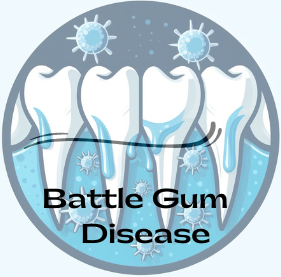
For general dental hygiene and wellbeing, maintaining ideal gum health is critical. Although brushing and flossing are important, many people don’t consider how nutrition affects gum health. Your diet has the power to either strengthen your gums or weaken your gums and cause gum disease. A nutritious, well-balanced diet lowers inflammation, encourages healing, and maintains gum tissue. On the other hand, gum disease and other problems with oral hygiene can result from a diet heavy in processed foods and sugar.
The relationship between diet and gum health will be discussed in this article, which answers key questions including whether diet can reverse gum disease, how nutrition affects periodontal health, and what kinds of foods are good or bad for your gums.
Can diet reverse gum disease?
A diet can greatly help prevent and manage gum disease, but it may not be able to totally reverse it. Good nutrition boosts the immune system, builds gum tissue, and lowers inflammation—all of which improve gum health.
How Diet Helps in Managing Gum Disease:
- Anti-Inflammatory Foods: Omega-3 fatty acids (found in fish, flaxseeds, and walnuts) help lower inflammation in the gums.
- Vitamin C: Citrus fruits, bell peppers, and leafy greens help repair gum tissue and prevent bleeding.
- Probiotics: Found in yogurt and fermented foods, probiotics can help balance oral bacteria and reduce harmful bacteria linked to gum disease.
Dietary Adjustments for Better Gum Health:
- Increase intake of fiber-rich foods (fruits, vegetables, and whole grains) to stimulate saliva production and remove plaque.
- Limit processed foods that contain high levels of sugar and preservatives, as they contribute to bacterial growth in the mouth.
- Stay hydrated to flush toxins and maintain oral hydration.
Although dietary changes promote gum health, gum disease must be reversed with professional procedures including scaling, root planing, and good oral hygiene.
What is the role of diet in dental health?
By supplying vital vitamins and minerals that support oral health, a nutrient-dense diet helps to maintain solid teeth and healthy gums.
Key Nutrients for Dental Health:
- Calcium and Phosphorus: Strengthen teeth enamel (found in dairy products, almonds, and tofu).
- Vitamin D: Enhances calcium absorption, promoting gum and bone health.
- Zinc: Supports immune function and reduces oral bacteria.
- Antioxidants: Help fight gum inflammation and tissue damage.
Unfavorable Dietary Elements That Impact Dental Health:
- High Sugar Intake: Leads to bacterial growth, plaque formation, and tooth decay.
- Acidic Foods and Beverages: Weakens enamel and irritates gums (e.g., soda, citrus juices).
- Sticky Foods: Increase plaque buildup and are difficult to remove from teeth.
What Kind of Diet is Good and Not Good for Your Oral Health?
Gum health can be improved or worsened by the quality of your food. It is essential to know what foods to eat and what to avoid.
Foods That Help Support Dental Health:
| Leafy greens and cruciferous vegetables | Contain calcium and probiotics. |
| Nuts and seeds | Rich in minerals and good fatty acids that promote gum health. |
| Green tea | Has antioxidants that aid in lowering inflammation. |
| Water | Removes food particles and keeps the mouth properly hydrated. |
Foods to Steer Clear Of:
| Sugary snacks and drinks | Enhances plaque accumulation and encourages bacteria. |
| Refined carbohydrates (white bread, pasta, pastries) | Converts into sugar, which fuels bacteria. |
| Citrus fruits and soda | Extremely acidic, which erodes enamel. |
| Alcohol and caffeine | causes dehydration, which lowers the production of saliva. |
How does diet affect gums?
Your food choices have a big impact on gum health since they affect tissue durability, bacterial balance, and inflammatory levels.
The Significant Impact of an Unhealthy Diet on Your Gums:
- Inflammation: High sugar and processed foods increase inflammation, leading to gum disease.
- Bacterial Overgrowth: Lack of probiotics and a high-sugar diet encourage harmful bacteria.
- Gum Recession: Nutrient deficiencies weaken gum tissue, making it prone to recession.
How to Implement a Diet to Promote Gum Health:
- Eat a rainbow of fruits and vegetables to ensure a variety of vitamins and minerals.
- Choose whole grains over refined grains to minimize sugar spikes.
- Incorporate healthy fats to reduce inflammation and support tissue repair.
Can poor nutrition cause periodontal disease?
Yes indeed, a major risk factor for periodontal disease is inadequate diet. Important vitamin and mineral deficiencies can cause decreased immunity, weakening gum tissue, and increased inflammation, all of which favor the growth of bacteria.
Nutrient Deficiencies and Their Impact:
| Nutrient | Deficiency Effect on Gums |
| Vitamin C | Bleeding, swollen gums |
| Vitamin D | Weakened bone support |
| Calcium | Bone loss, loose teeth |
| Zinc | Increased bacterial growth |
As you can see, a balanced diet gives the body the resources it needs to combat infections and preserve healthy gum tissue.
What is the importance of nutrition to periodontal health?
A healthy diet boosts the body’s defenses against bacteria, improves gum tissue, and lowers inflammation. Long-term periodontal health depends on eating a healthy diet.
There are benefits to having good nutrition for your gum health. The gums’ connective tissue is strengthened by the essential vitamins and minerals we consume with our diets. A nutritious diet makes it easier for our immune system to defend against germs.
Moreover, foods that reduce inflammation assist in maintaining our healthy gums and stop the spread of illness. Foods high in nutrients promote healing by assisting in the restoration of gum tissue following dental procedures. So, it is extremely necessary to eat a balanced nutritional diet to help with oral and gum health.
Conclusion
Diet has an indisputable impact on gum health. Although brushing and flossing are important, your diet has a big influence on the health of your gums. Strong, healthy gums are encouraged by a diet high in antioxidants, vitamins, and minerals, whereas processed foods and sugary sweets increase inflammation and illness.
You can take proactive measures to maintain ideal gum health by making thoughtful dietary decisions such as consuming more fiber, foods high in probiotics, and less sugar. Combining proper nutrition with regular dental care ensures a lifetime of strong gums and a healthy smile.
“Here’s a little transparency: Our website contains affiliate links. This means if you click and make a purchase, we may receive a small commission. Don’t worry, there’s no extra cost to you. It’s a simple way you can support our mission to bring you quality content.”
